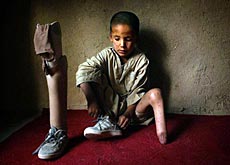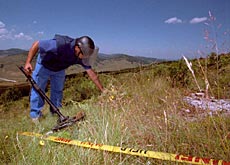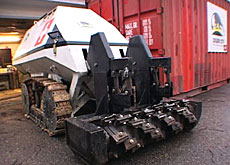Nations renew pledge to rid world of mines

Swiss officials say efforts to rid the world of anti-personnel mines have been given a boost at a major international conference in Nairobi, Kenya.
The 144 participating countries approved a five-year action plan, committing them to destroy stockpiles and push ahead with demining efforts.
The meeting was the first five-year review of the 1997 Ottawa Convention on Landmines, which came into force in 1999.
Switzerland’s state secretary for foreign affairs, Franz von Däniken, told swissinfo the action plan was a major achievement of the five-day summit, which ended on Friday.
“This action plan is an efficient and dynamic instrument that highlights the continuation of the commitments of all contracting parties,” he told swissinfo.
He added that the ultimate goal of the Ottawa convention was that all member states would agree to a global ban on landmines. “It is the general wish of all contracting parties of the Ottawa convention that this convention should be applied universally, including the big countries.”
Rebels
Non-governmental organisations observing the meeting criticised the lack of concrete measures, and said “non-state actors”, such as rebel groups, should be included in efforts to ban anti-personnel mines.
Von Däniken said that holding the summit on the African continent, where millions fell victim to mines, had substantially increased awareness of difficulties of removing these weapons, once they had been laid.
He added that the meeting was also a success for Switzerland, because the goals presented by his delegation had received wide support.
“It is not only about demining, [but also] about victim assistance, awareness campaigns … and governmental and non-governmental commitment to the mine ban treaty,” he explained.
Swiss role
Von Däniken said Switzerland, which will have the chairmanship of the committee for victim assistance in 2006 together with Afghanistan, played an important role in the fight against landmines.
Elisabeth Reusse-Decrey, president and founder of the Swiss anti-mine group “Geneva Call”, agreed.
“Only in Switzerland can rebel group leaders meet and [make a commitment] to stop using mines,” she told swissinfo.
She said the summit had fallen short of the expectations of participating NGOs because they had been hoping for more concrete measures.
Conflict parties
But she added that there had been awareness of the need to engage conflict parties which were not accountable to national governments.
“For the first time many countries mentioned the importance of engaging non-state actors and recognising the role of Geneva Call … So it has been a success because this work is recognised internationally for the first time.”
Reusse-Decrey identified a drop in funding and continuing use of mines in civil war as the primary obstacles to stopping the use of mines.
Von Däniken made clear that Switzerland would continue to provide financing, adding that with SFr16 million the country was the 12th biggest sponsor in the fight against anti-personnel mines.
swissinfo, Katalin Fekete
152 states have signed and 144 have ratified the 1997 Ottawa Convention.
Switzerland was among the first countries to sign the treaty in December 1997
Between 15,000 and 20,000 people are killed by anti-personnel mines every year.
The anti-personnel mine ban treaty aims to achieve a mine-free world, prohibiting signatory member states from using, stockpiling, producing or transferring anti-personnel mines and requires them to destruct existing mines.
The United States, Russia, China, India and Pakistan have refused to sign up to the treaty, although the US has not used anti-personnel mines since 1991 and spends more money on mine clearance and victim assistance than any other country.

In compliance with the JTI standards
More: SWI swissinfo.ch certified by the Journalism Trust Initiative











You can find an overview of ongoing debates with our journalists here . Please join us!
If you want to start a conversation about a topic raised in this article or want to report factual errors, email us at english@swissinfo.ch.